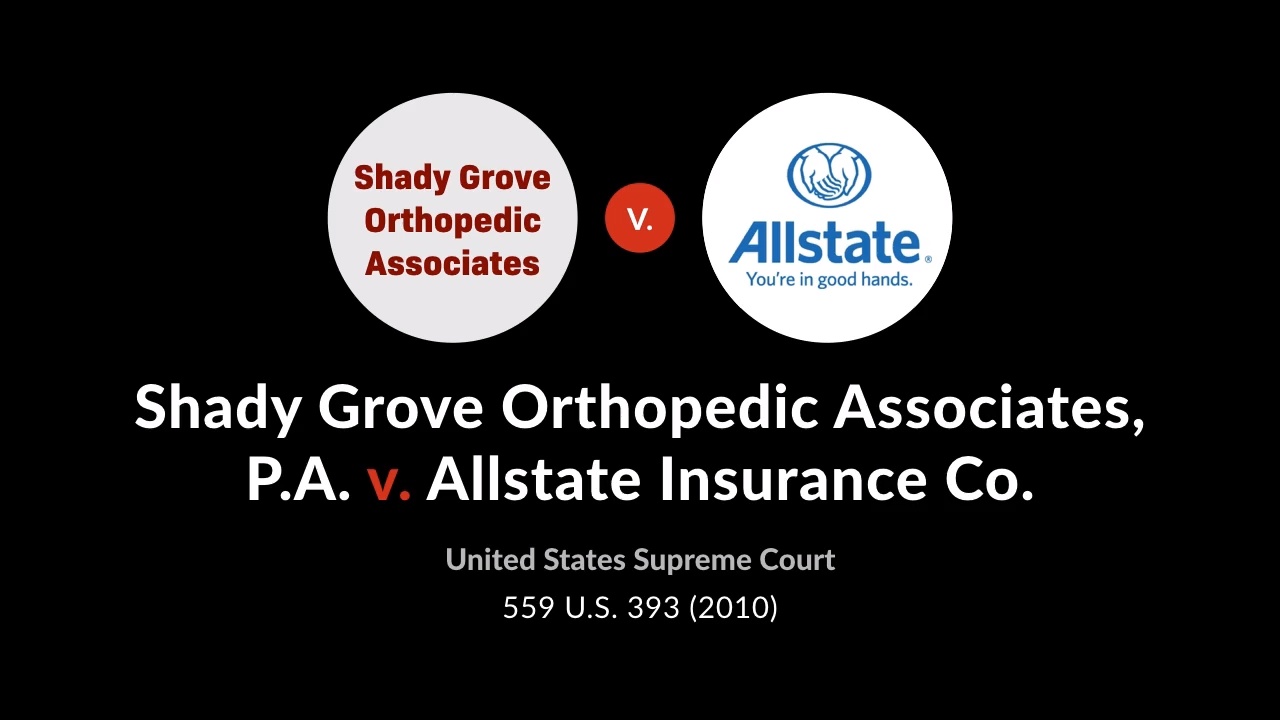Shady Grove Orthopedic v. Allstate is a landmark case that explores the complex legal issues surrounding medical expenses and insurance coverage. This case, which has captivated the attention of legal scholars and practitioners alike, offers a fascinating glimpse into the intricate interplay between law, medicine, and finance.
The case revolves around a dispute between Shady Grove Orthopedic, a medical provider, and Allstate, an insurance company. Shady Grove Orthopedic alleged that Allstate wrongfully denied coverage for medically necessary treatments provided to its patients. The ensuing legal battle has raised fundamental questions about the interpretation of insurance policies, the scope of coverage for medical expenses, and the rights and responsibilities of both healthcare providers and insurance companies.
Case Overview

In Shady Grove Orthopedic Associates, P.A. v. Allstate Insurance Company, a medical provider sued an insurance company for breach of contract. The provider alleged that Allstate failed to pay for medical services rendered to an insured patient.
The case was filed in the United States District Court for the District of Maryland. The legal issues at stake included the interpretation of the insurance policy and the provider’s right to payment under the policy.
The procedural history of the case included a motion for summary judgment by Allstate, which was denied by the court. The case proceeded to trial, where a jury found in favor of the provider.
Legal Arguments
The provider argued that the insurance policy required Allstate to pay for the medical services rendered to the patient. The provider also argued that it was entitled to payment under the policy’s “usual and customary” provision, which provided for payment of charges that were reasonable and customary in the provider’s geographic area.
Allstate argued that the policy did not require it to pay for the services rendered to the patient. Allstate also argued that the provider’s charges were not reasonable and customary.
The key legal issues in dispute were the interpretation of the insurance policy and the provider’s right to payment under the policy’s “usual and customary” provision.
Expert Testimony
Both the provider and Allstate presented expert witnesses to testify about the reasonableness and customary nature of the provider’s charges.
The provider’s expert witness testified that the charges were reasonable and customary in the provider’s geographic area. The Allstate’s expert witness testified that the charges were not reasonable and customary.
The jury ultimately found that the provider’s charges were reasonable and customary, and awarded the provider damages.
Jury Instructions: Shady Grove Orthopedic V. Allstate
The judge instructed the jury that they must determine whether the provider’s charges were reasonable and customary in the provider’s geographic area.
The judge also instructed the jury that they must interpret the insurance policy in accordance with its plain meaning.
The jury’s verdict was based on their finding that the provider’s charges were reasonable and customary, and that Allstate was therefore liable for payment under the policy.
Verdict and Appeal

The jury found in favor of the provider and awarded damages. Allstate appealed the verdict, but the appellate court affirmed the lower court’s decision.
The verdict and appellate decision established that Allstate was liable for payment under the insurance policy, and that the provider’s charges were reasonable and customary.
FAQ Explained
What was the main legal issue in Shady Grove Orthopedic v. Allstate?
The main legal issue was whether Allstate wrongfully denied coverage for medically necessary treatments provided by Shady Grove Orthopedic.
What was the outcome of the case?
The court ruled in favor of Shady Grove Orthopedic, holding that Allstate had breached its duty to act in good faith and had wrongfully denied coverage for medically necessary treatments.
What are the implications of the case for the healthcare industry and the insurance sector?
The case has set important precedents regarding the enforceability of insurance contracts, the duty of insurers to act in good faith, and the rights of patients to access necessary medical care.